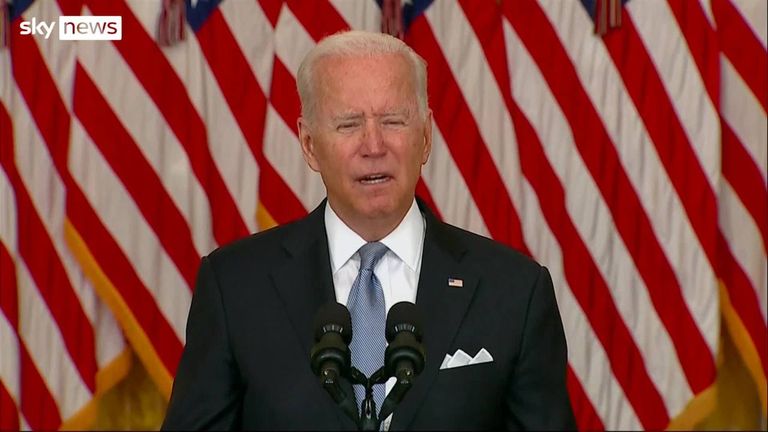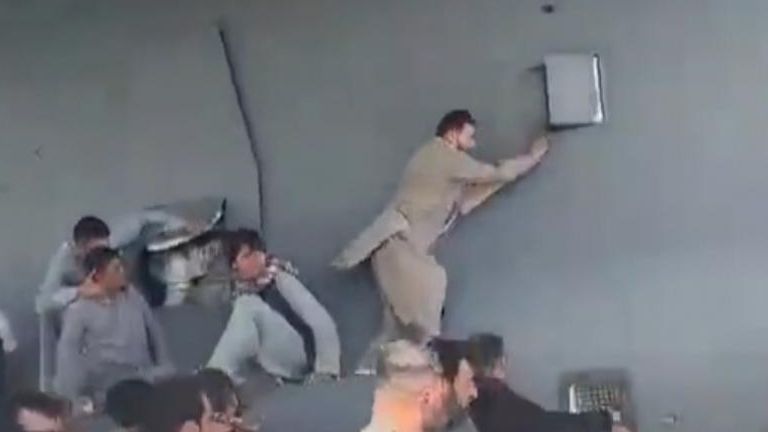The president’s address to the nation was just that – a speech carefully scripted for domestic consumption.
Never mind that around the world there was an eagerness to understand the wisdom of his decision.
With an all-American backdrop – the stars and stripes filling the space behind him – Joe Biden made a compelling case for why America needed to leave Afghanistan.
“We went to Afghanistan almost 20 years ago with clear goals: get those who attacked us on September 11th, 2001, and make sure al Qaeda could not use Afghanistan as a base from which to attack us again.
“We did that… Our mission in Afghanistan was never supposed to have been nation building. It was never supposed to be creating a unified, centralised democracy.”
The core of his argument was that staying in Afghanistan would have been futile. He conceded that despite trillions of dollars of military equipment and training, as well as blood and sweat, the Afghan military were unable to stand alone.
“There is no chance that one year, one more year, five more years, or 20 more years of US military boots on the ground would’ve made any difference,” he said.
He was speaking to an American public about an issue which, according to polling, does resonate: America’s forever wars.
“How many more generations of America’s daughters and sons would you have me send to fight Afghans – Afghanistan’s civil war – when Afghan troops will not? How many more lives, American lives, is it worth? How many endless rows of headstones at Arlington National Cemetery?”
Yet the fact is that at the point when Mr Biden decided to pull the plug, there were only 2,500 US soldiers in Afghanistan. They were not in an active combat role. They were not coming home in coffins. Afghanistan was, as one former US ambassador to Afghanistan put it to me, “not a red button issue”.
In fact, it is more of a red button issue now given the manner in which the US pulled out.
On this, the president offered little. Despite the images which continue to emerge from Afghanistan, including the tragic pictures of people appearing to fall from a plane as it pulled up from a crowded airstrip, he did not attempt to explain, defend or acknowledge the way in which the United States executed the pull out.
He said: “The scenes we’re seeing in Afghanistan, they’re gut-wrenching, particularly for our veterans, our diplomats, humanitarian workers, for anyone who has spent time on the ground working to support the Afghan people.
“For those who have lost loved ones in Afghanistan and for Americans who have fought and served in the country, serve our country in Afghanistan, this is deeply, deeply personal. It is for me as well.”
He danced a fine line for the home audience, claiming in one breath that this was the right decision – the only decision – but then arguing that he was forced to follow through on a bad deal which Donald Trump struck with the Taliban.
“I inherited a deal that President Trump negotiated with the Taliban. Under his agreement, US forces would be out of Afghanistan by May 1, 2021, just a little over three months after I took office.
“US forces had already drawn down during the Trump administration from roughly 15,500 American forces to 2,500 troops in country, and the Taliban was at its strongest militarily since 2001.
“The choice I had to make, as your president, was either to follow through on that agreement or be prepared to go back to fighting the Taliban in the middle of the spring fighting season.”
He knows that the decision was on him. “I am president of the United States of America, and the buck stops with me,” he said. And he expressed regret for how it’s unfolded: “I am deeply saddened by the facts we now face.”
He knows it has caused unease and upset among allies who wonder now about what the value of US commitment is or indeed wonder about the wisdom of American decisions and the quality of its intelligence.
He knows too that America’s foes will be sporting more than just a wry smile. But, he stood by the decision.
“I do not regret my decision to end America’s warfighting in Afghanistan and maintain a laser-focus on our counterterrorism missions there and in other parts of the world.”
And so it was a doubling down of his decision. He chose not to appear contrite about the chaos.
Most strikingly, this did not feel at all like a message for the people of Afghanistan. He talked frequently about “commitments”, but they were commitments to the American people.
The time has come, he seems to have concluded, to end American commitments to Afghanistan, however hard that may be.








